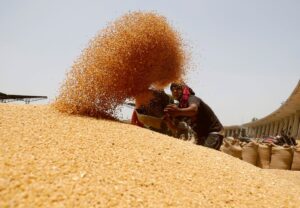Bangladesh likely to raise food grain import budget by 34%

Dhaka: The government is going to increase funds by 34% for imports of food grain in the upcoming fiscal year 2024-25 while reducing allocation by nearly 18% for domestic procurement.
Senior officials say the government wants to increase allocation for imports of food grains amid fall in global food production and dollar rate increase against the taka so that it can spend the fund when needed to ensure food security.
In comparison to the main budget allocation for rice and wheat imports from abroad in the current fiscal year, there will be an additional allocation of more than Tk1,704 crore while the funding for domestic procurement is being reduced by Tk1,623 crore, according to the minutes of a meeting of the food ministry’s budget management committee
During the meeting, it was proposed that the government allocate Tk3,862 crore for rice import in FY25. The allocation for rice import in the original budget for the current fiscal year was Tk2,592 crore. On the other hand, Tk2,834 crore has been proposed for allocation for wheat import from abroad in the upcoming fiscal year. The allocation for the sector in the current fiscal year was Tk2,398 crore.
Meanwhile, a budget allocation of Tk7,441 crore has been proposed for domestic rice procurement in FY25. The original budget for the current fiscal year had allocated Tk8,750 crore for the purpose.
On the other hand, a nominal allocation of only Tk36 crore has been proposed for domestic wheat procurement in the upcoming fiscal year. The allocation for the sector in the original budget for the current fiscal year was Tk350 crore.
Food Secretary Md Ismail Hossain told TBS, “The budget allocation for food procurement is divided into two categories: domestic procurement and foreign procurement. However, it is not always necessary to import from abroad. For instance, in the current fiscal year, the government did not import any rice from abroad, even though an allocation was made in the budget. The rice was procured from domestic sources using the allocation.”
Similarly, there is no specific plan for rice procurement from abroad in the upcoming fiscal year, he said. “However, this allocation has been proposed as a precautionary measure.”
Arguing for the increase in allocation for food grain imports, he said, “This is because global food production has decreased by approximately 20%, and there is a risk of price increases. Besides, the dollar exchange rate has risen. This allocation has been proposed to provide the flexibility to spend if necessary.”
The secretary said there will be no shortage of food supply in the country. “Domestic production has been good. Even so, the government will ensure supply if the need arises.”
Food procurement target from local sources
On 6 May, the food ministry announced a target of procuring 5 lakh tonnes of paddy in the current boro season. The government will procure each kilogram of boro paddy at a price of Tk32. Paddy procurement will commence on May 7 and continue until August 31.
Simultaneously, the government announced plans to procure 50,000 tonnes of wheat from across the country at a price of Tk34 per kilogram. Besides, the government will procure 11 lakh tonnes of boiled rice during the boro season at a price of Tk45 per kilogram. A target of procuring 1 lakh tonnes of atap rice has been set at a price of Tl44 per kilogram.
The government procures the highest quantity of paddy and rice from domestic sources during the boro season. The food ministry expects 3.20 crore tonnes of paddy to be produced nationwide during the boro season this year.
The government also procures paddy and rice from the aman season, but the quantity is less than half of that of the boro season.
In the boro season of 2023, the government had set a target of procuring 4 lakh tonnes of paddy, 14.5 lakh tonnes of boiled rice, and 1 lakh tonnes of wheat from the country. According to information published on the food ministry’s website on 5 May, the government has a stock of 11,04,276 tonnes of food in its warehouses. Of the quantity, 7,49,769 tonnes are rice and the remaining 3,54,507 tonnes are paddy.
Food grain procurement management cost to fall
The food ministry has projected that management costs for food procurement will be lower in the upcoming fiscal year. The ministry has proposed an allocation of Tk1,245 crore for the purpose in the next fiscal year. The current year’s allocation for the purpose is Tk1,483 crore.
However, the food ministry’s budget allocation for open market sales (OMS) of food grains is increasing by Tk308 crore in FY25. An allocation of Tk5,316 crore is being proposed for the sale of rice and flour at low prices through OMS in the upcoming fiscal year. The allocation was Tk5,008 crore in the budget for the current fiscal year. OMS activities are being expanded across the country. Currently, products are being sold through OMS cards at 400 centres in various areas.
The government provides rice and flour at low prices through OMS and Food-Friendly Programme. The food ministry has informed that around 10 lakh OMS cards have been issued across the country so far. Smart OMS cards are being introduced for those who purchase products from OMS from the Secretariat. Initially, 6000 smart cards will be issued, according to food ministry sources. However, around 15,000 cards will be issued in phases for the Secretariat OMS centres.
A customer can purchase 5 kg of rice at Tk30 per kg and 4 kg of flour at Tk24 per kg once a week using the card. Under the Food-Friendly Programme, the government provides 30 kg of rice to 50 lakh families across the country for six months at a price of Tk15 per kg. The government has to provide subsidies for this. According to finance ministry officials, around Tk7,000 crore may be allocated for food subsidies in the upcoming fiscal year.
The food secretary said that OMS is open to everyone. “However, cards have been introduced to bring this programme under a rule. Smart cards will be gradually introduced in all areas. A family can take rice and flour once a week from a single card.”
Besides, measures have been taken to ensure that those who are in the Food-Friendly Programme are not simultaneously enrolled in other similar programmes, he said. This initiative has resulted in a decrease of approximately three lakh beneficiaries, said the secretary.
Prioritising initiatives to ensure food security
At an event organised by the Economic Reporters Forum, economist Debapriya Bhattacharya, on 7 May advised giving the highest priority to initiatives to ensure food security in the current economic situation.
He said that the crops have been good this year. “The government needs to ensure food security. Stocks need to be increased. Sales in the open market need to be increased. This programme needs to be taken to the rural areas.”
Debapriya, also a distinguished fellow of the Centre for Policy Dialogue, also said, “The list of those who are being given benefits through family cards needs to be published so that the local people can verify whether those who are getting the benefit are eligible.”




